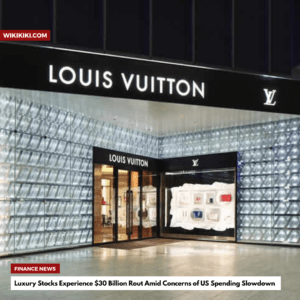The luxury stocks market took a hit on Tuesday as concerns over a potential US spending slowdown grew. European-listed luxury companies, including LVMH, Hermes, and Kering, experienced a significant decline in their stock prices, leading to a loss of nearly $30 billion in market value for the sector. Investors are increasingly worried about the impact of slowing growth in the US on the luxury-goods industry, particularly due to signs of softening demand from aspirational consumers who are more economically sensitive.
Also Read: World’s First Cryptocurrency Rules Approved by EU States

Luxury stocks in Europe, such as LVMH, Hermes, and Kering, experienced a notable slump as concerns over a potential US spending slowdown intensified. LVMH saw a 3% drop, while Hermes and Kering witnessed declines of 4% and 2%, respectively. This decline in stock prices reflects growing anxieties among investors regarding the impact of a US economic slowdown on luxury goods consumption.
Building Concerns and Deutsche Bank’s Analysis
Deutsche Bank analysts highlighted the “building concern” surrounding slowing growth in the US luxury goods market. With signs of softening demand from economically sensitive aspirational consumers, the prospect of negative year-on-year growth in the US has become a significant worry for the luxury industry. Many economic forecasters predict a potential economic slump or recession in the US later in the year, which could result in reduced consumer spending on luxury goods.
Also Read: Saudi Aramco Postpones IPO of Energy Trading Unit
Projected Economic Slump and Impact on Luxury Spending
Many forecasters have predicted an economic slump or even a recession in the US later in the year, with first-quarter GDP growth slowing to just 1.1% in 2023. Deutsche Bank’s base case suggests that the anticipated slowdown will affect consumers’ spending power, resulting in reduced spending on luxury goods.
Deutsche Bank’s base case suggests that a US spending slowdown would directly affect consumers’ purchasing power, leading to reduced expenditures on luxury goods. Luxury companies heavily rely on consumer sentiment and discretionary spending, making them vulnerable to changes in economic conditions. If US consumers become more cautious with their spending, it could significantly impact the revenue and profitability of luxury brands.
Strong Start to 2023 Dimmed by US Spending Concerns
Prior to the recent selloff, luxury stocks had enjoyed a robust performance in 2023, largely driven by expectations of increased sales due to China’s economic reopening. LVMH, for instance, had seen a 25% increase in share price year-to-date, with the company recently achieving a $500 billion valuation. Similarly, Hermes had jumped 34% in 2023, while Kering had experienced a more modest 12% gain. However, the current concerns over US spending have dampened the sector’s performance.
Previous Performance and Factors Driving Luxury Stocks
Before the recent selloff, luxury stocks had a strong start to 2023, driven by expectations of increased sales due to China’s economic reopening. LVMH shares, despite the decline, remained up 25% year-to-date, with the company recently achieving a $500 billion valuation. Hermes witnessed a significant jump of 34% in 2023, while Kering experienced more modest growth of 12%.
Also Read: Japan G7 Summit Leaders Partners to Visit Hiroshima Museum
Selective Approach and Potential Impact on European Markets
Deutsche Bank analysts suggested that investors may become more selective in the luxury sector, considering factors such as earnings momentum, amid concerns of a US spending slowdown. The luxury sector’s premium to the market has reached historically high levels, making it a crowded long for many investors. A shift in investor sentiment towards luxury stocks could affect the overall attractiveness of European stocks as a hedge against US risks, potentially impacting the performance of the Stoxx Europe 600 index.
Analyst Insights and Selective Investor Behavior
Deutsche Bank analysts emphasized the need for investors to be more selective in the luxury sector, citing its crowded long position and historically high premium to the market. They highlighted the importance of considering earnings momentum and expected a shift in investor behavior towards more cautious investment strategies.
Conclusion
The recent decline in luxury stocks, including LVMH, Hermes, and Kering, reflects growing concerns among investors about a potential US spending slowdown. The impact of slowing growth in the US on the luxury-goods industry and the aspirations of economically sensitive consumers are becoming significant factors in investment decisions. As the luxury sector faces challenges, investors are advised to adopt a more selective approach. However, despite the recent losses, luxury stocks had a strong performance earlier in the year, driven by factors such as China’s economic reopening.
Also Read: Netflix Announces Premiere Window for Squid Game Reality Show



















+ There are no comments
Add yours